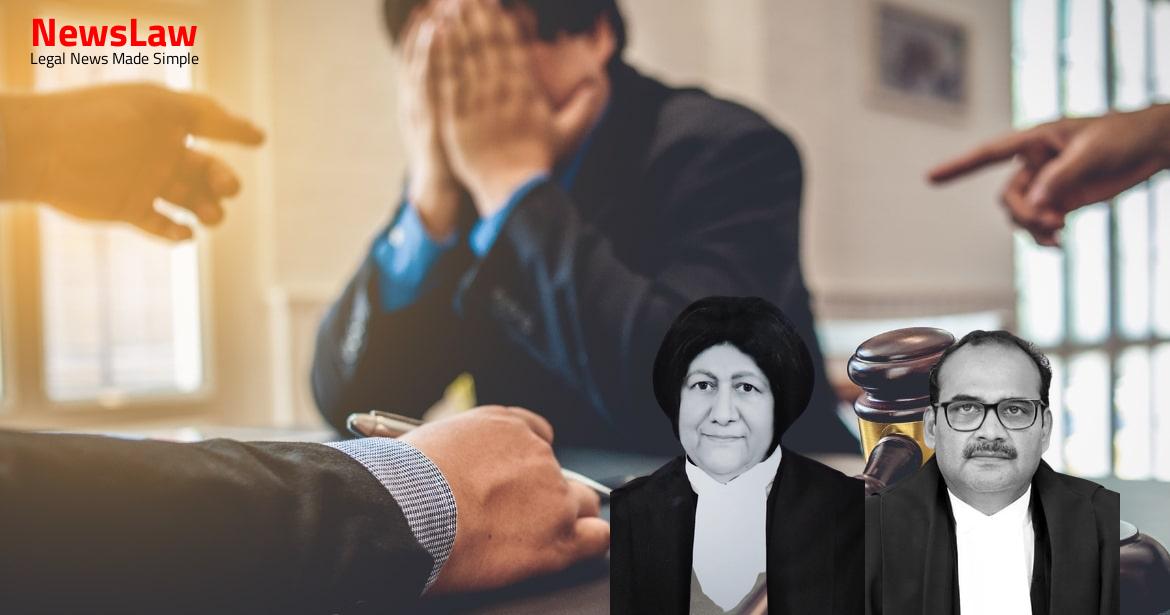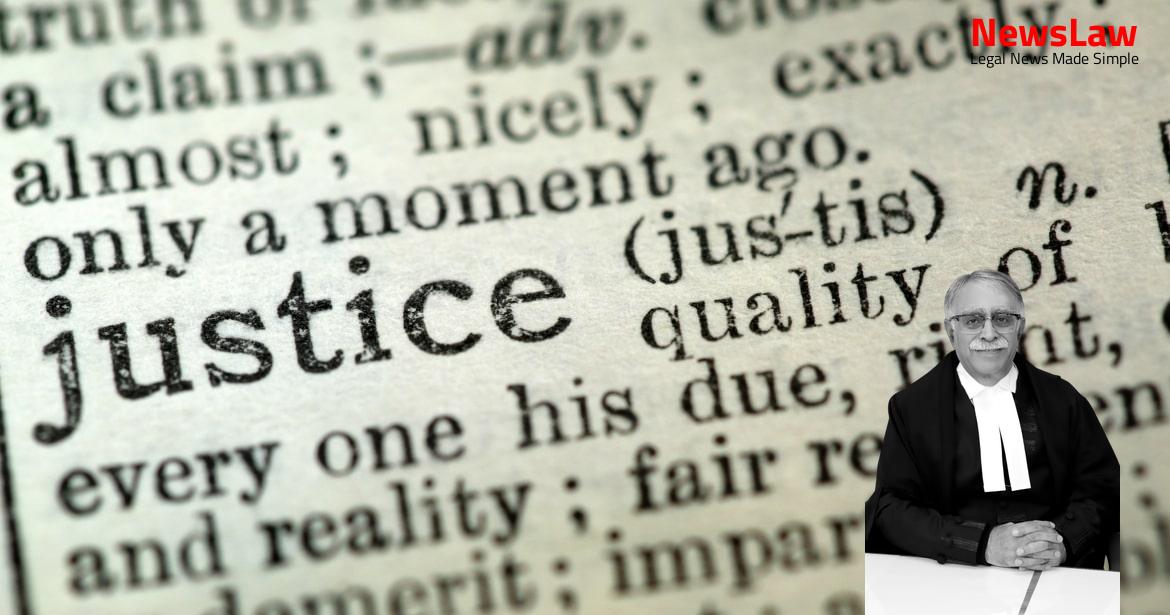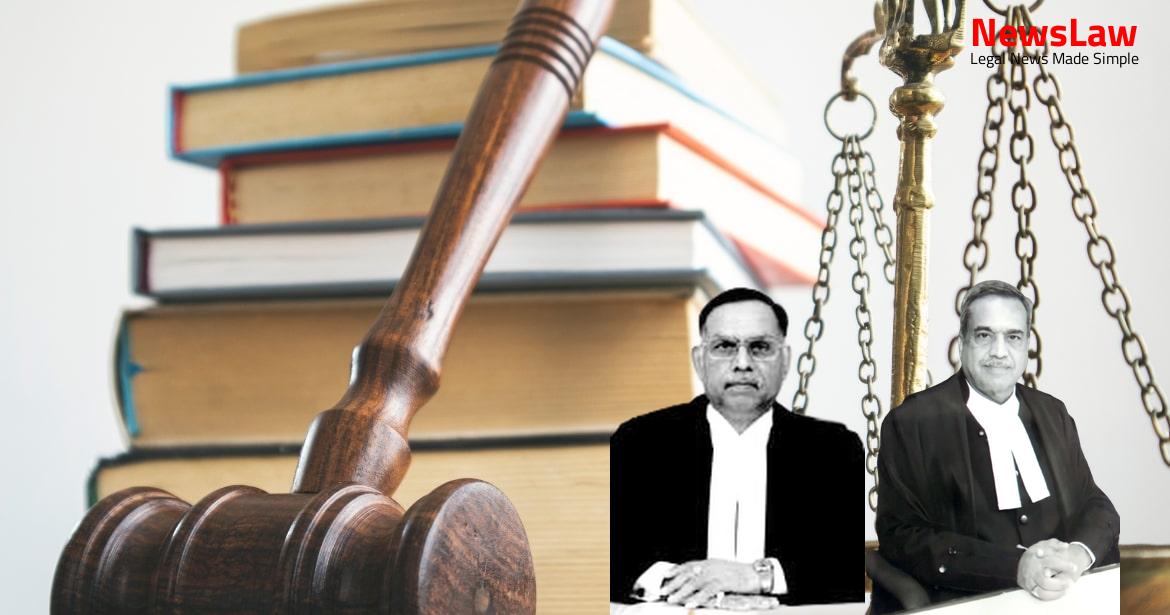Delve into the nuanced legal debate surrounding jurisdiction and investigation procedures in cases under the POCSO Act. This blog post focuses on the court’s in-depth legal analysis and debate on whether special laws supersede general procedural laws. Stay tuned for a comprehensive exploration of the key legal questions at play.
Facts
- Appellant filed for discharge under Section 227 of the Cr.P.C. citing non-cognizable nature of offence under Section 23 of POCSO.
- Trial Court dismissed the application, leading to a Criminal Petition under Section 482 of Cr.P.C. in the High Court.
- News report in Karavali Munjavu highlighted the sexual harassment of a 16-year-old girl by the Appellant.
- Complaint lodged against the Appellant under Section 23 of POCSO, initiating Case No.203/2017.
- Appeal made against the High Court of Karnataka’s dismissal of Criminal Petition No.101420/2020 under Section 482 of Cr.P.C.
- Principal District Judge took cognizance against the Appellant for offence under Section 23 of POCSO.
- Key legal question: Whether Section 155(2) of the Cr.P.C. applies to the investigation of offences under Section 23 of POCSO.
- Debate on whether Special Court can take cognizance of the offence without permission from the jurisdictional Magistrate for police investigation.
- Appellant is the Editor of Karavali Munjavu Newspaper.
- Police filed a report under Section 173 of the Cr.P.C. in the Court of the Principal District Judge, Uttar Kannada, Karwar.
- Mr. Kamat emphasized that all offences, including Section 23 of POCSO, must be investigated and tried in accordance with Section 4(2) of the Cr.P.C.
- The High Court dismissed the Criminal Petition, stating that Section 19 of POCSO supersedes the Cr.P.C., including Section 155.
- The Court of the Principal District Judge took cognizance of the alleged offense and issued summons to the Appellant.
- The High Court declined to quash the proceedings under Section 23 of POCSO against the Appellant.
- Mr. Devdutt Kamat argued that the Cr.P.C. applies to all offenses unless a special law provides a different procedure, overriding the Cr.P.C.
Also Read: Analysis of Financial Statements as Acknowledgment in Limitation Act Case
Arguments
- Mr. Kamat argued that the initial action of investigation against the Appellant under Section 23 of POCSO was illegal, thus vitiating all subsequent actions.
- He referred to Section 2(n) of the Cr.P.C. to define ‘offence’ and argued against the High Court’s finding that Cr.P.C. provisions were excluded for Section 23 of POCSO.
- Cited Keshav Lal Thakur v. State of Bihar to support the argument that proceedings against the Appellant should be quashed for lack of permission from the jurisdictional Magistrate under Section 155(2) of Cr.P.C.
- Referred to State of Punjab v. Davinder Pal Singh Bhullar to strengthen the argument.
- Argued that Section 19 of POCSO, which excludes Cr.P.C. for reporting offenses, does not apply to Section 23 of POCSO.
- Emphasized that Section 31 of POCSO prohibits Police Officers from investigating non-cognizable offenses without Magistrate’s order, citing Section 155(2) of Cr.P.C.
- Highlighted the importance of Section 33(9) of POCSO for trial proceedings to be conducted as per Cr.P.C.
- Argued that the mandatory provision of Section 155(2) of Cr.P.C. makes it necessary for Police Officers to seek permission from Magistrate before investigating non-cognizable cases.
- Stated that POCSO being a special enactment overrides general procedural laws.
- Mr. Padhi cited the case of Fertico Marketing and Investment Private Limited v. Central Bureau of Investigation and Another to support his argument.
- Mr. Padhi argued that the order taking cognizance and framing charges cannot be vitiated solely based on the police not taking prior permission of the concerned jurisdictional Magistrate.
- The case had progressed beyond the investigation stage with a chargesheet already filed, and the accused must demonstrate grave prejudice, which the Appellant failed to do.
- Mr. Kamat contended that this case is about investigation without jurisdiction, not defective investigation as argued by the State.
- Mr. Padhi distinguished the case of Keshav Lal Thakur and H. N. Rishbud and Others from the current scenario.
- Mr. Kamat argued that defective investigation may not necessarily lead to the vitiating of a trial unless there is a miscarriage of justice.
- Sections 462 and 465 of the Cr.P.C. cited by Mr. Padhi were contended by Mr. Kamat as not being applicable in this case.
- Section 4(2) of the Cr.P.C. requires offences under other laws to be dealt with according to the provisions of the Cr.P.C., subject to any governing enactment, and is not vitiated by defects in the investigation.
Also Read: Landmark Legal Analysis in Conviction Appeal Case
Analysis
- Children have inalienable human rights to live with dignity, grow up in a healthy environment, be treated equally, and not face discrimination.
- The case of Keshav Lal Thakur is different as it dealt with an offense under the Representation of People Act, 1950, which does not regulate investigation procedures.
- The judgment in Davindar Pal Singh Bhullar sets a precedent on protecting children’s rights and prohibiting exploitation.
- The legal maxim ‘sublato fundamento cadit opus’ is not relevant here.
- Article 39(f) of the Directive Principles of State Policy emphasizes protecting children’s freedom and dignity.
- Children have the right to be safeguarded from offenses and their dignity needs to be respected.
- Revealing the identity of child victims of sexual offenses violates their right to dignity and privacy.
- The Convention on the Rights of the Child and Article 16 prohibits arbitrary interference with a child’s privacy.
- India, by ratifying the Convention on the Rights of the Child, commits to protecting children from exploitation.
- The case of Nipun Saxena v. Union of India highlights the right of a child to privacy and protection from interference.
- Investigation into whether an offence has been committed and whether the child requires special care.
- Prohibition on disclosure of the name, address, or any other identifying information of children in conflict with the law or victims of crime.
- Prevention of disclosure of the identity of the victim under various laws such as IPC, Cr.P.C., JJ Act, and POCSO.
- Immediate arrangements for care and protection of a child in need after an offence has been reported.
- Prohibition on arbitrary interference with privacy and attacks on honor and reputation.
- Punishment for disclosure of the identity of a rape victim under IPC.
- Requirement for conducting rape trials in camera as per Cr.P.C.
- Protection of fundamental rights such as right to dignity, personal liberty, privacy, equality, and against discrimination.
- POCSO not only protects children from sexual offences but also protects the interests of children in general, as victims and witnesses.
- Children who are victims of offences under Section 23 of POCSO may require special protection, care, and shelter, necessitating expeditious investigation for compliance.
- The argument that the proceedings were vitiated due to lack of prior permission from the jurisdictional Magistrate for investigating the alleged offence is not accepted.
- The appeal was dismissed as the appellant would need to defend the proceedings under Section 23 of POCSO on merits.
- Action under sub-section (5) of Section 19 of POCSO must be taken promptly for the protection of the child.
- Sections 31 and 33(9) of POCSO do not relate to reporting or investigation of an offence.
- The impugned order of the Special Court taking cognizance of the complaint against the appellant was found legally sound.
- The expression ‘investigation’ has not been expressly incorporated in relevant sections of POCSO.
- Section 19 of POCSO includes all offences under POCSO, including offences under Section 23.
- Mr. Kamat’s argument that Section 19 of POCSO excludes offences under Section 23 is deemed unsustainable.
- Legislative intent is derived from the plain meaning of the words used in a statute.
- Disclosure of the child’s identity in the media can expose them to retaliatory threats.
- The child should be brought up in an atmosphere of happiness, understanding, and dignity for their full development.
- Reports under sub-section (6) of Section 19 of POCSO are to be made promptly to relevant authorities for the care and protection of the child.
- The Special Court is to try offences under POCSO as if it were a Court of Sessions, in accordance with the Cr.P.C.
- Section 23 of POCSO protects child victims of sexual abuse from intrusion into privacy and mental agony, which must be strictly enforced.
Also Read: Analysis of Territorial Jurisdiction in Arbitration Transfer Petition
Case Title: GANGADHAR NARAYAN NAYAK @ GANGADHAR HIREGUTTI Vs. THE STATE OF KARNATAKA (2022 INSC 318)
Case Number: Crl.A. No.-000451-000451 / 2022



